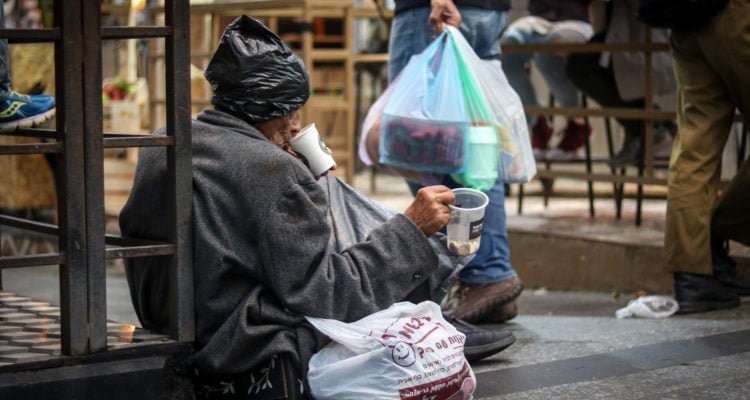Latet, Israel’s largest nonprofit organization, published its annual poverty report Monday.
By Shahar Ilan, Calcalist
Over the past 12 months, Israel has seen an increase in nutritional insecurity and hunger, according to a report published Monday by Latet, Israel’s largest nonprofit organization.
An umbrella organization for many local groups and associations, Latet operates a food bank and provides monthly food assistance to tens of thousands of families.
According to the report, the number of Israelis suffering from nutrition insecurity, defined as a lack of access to a wide range of foods that provide all essential nutrients, rose from 16% in 2018 to 18.5% in 2019. The number of those suffering from food insecurity rose from 5.5% to 6.5%. Among Israelis supported by local charity groups, 12% said they had to resort to humiliating situations such as looking for food in garbage bins or begging, up from 9% last year.
The report’s authors state that poverty in Israel has stayed roughly the same over the past six years, with minor yearly deviations. According to the report, 2.3 million in Israel are defined as poor, the same as in 2018, but last year that number accounted for 26.5% of the population while in 2019 it accounts for 25.5%.
The number of poor children remained 1 million, but their percentage in the population dropped from 36% to 33.5%.
According to Gilad Tanay of the ERI research institute for social impact, who developed the multi-facet index used in Latet’s report, Israel has not seen any policy changes that could help people overcome prolonged poverty.
Latet’s alternative poverty report was created following criticism of the annual poverty report published by Bituach Leumi, Israel’s national social security agency. While Bituach Leumi’s report considers only income, Latet’s index defines insecurity in five areas required for what researchers call a “dignified existence”: housing, education, health, nutrition security, and the ability to withstand the costs of living.
Bituach Leumi’s report for 2018 will be published at the end of the month. The agency’s 2017 report found that 21% of the general population, 18.4% of Israeli families, and 29.6% of children were considered poor – considerably lower rates than Latet’s findings.
Latet’s report also surveyed what assisted families reported having to give up due to their economic situation. Eighty seven percent could not fund after-school and enrichment activities for their children, as well as school trips, compared to 30% of the general population.
Fifty nine percent of those surveyed said they avoided placing one child or more aged 0-3 in care facilities due to monetary concerns. In Israel, child care is state-funded only from the age of three.
Israel’s governments have maintained poverty rates in the country for many years due to harmful prioritization that abandons a quarter of the population, Latet’s executive director Eran Weintrob said in a statement.
“Frequent elections, a paralyzed parliament, and an interim government that cannot pass major decisions have lost us a year. But unlike in politics, hardship cannot be suspended,” he said. “Without a government plan and long-term strategies, poverty cannot be overcome.”





